On Thursday, 17th July, the James Hutton Institute held its annual Fruit for the Future event at the Invergowrie campus in Dundee. Growers, breeders, and scientists came together to learn about the work being done on breeding new varieties to overcome the challenges of climate change and the sustainability of the soft fruit industry.
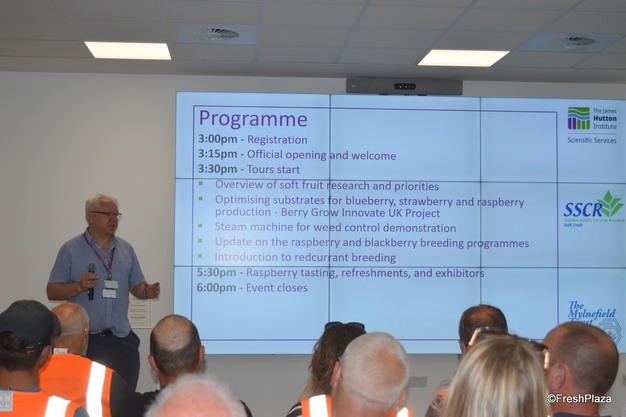
Jonathon Snape
Guests were welcomed by soft fruit grower Peter Thompson and Jonathon Snape, Head of the James Hutton Institute.
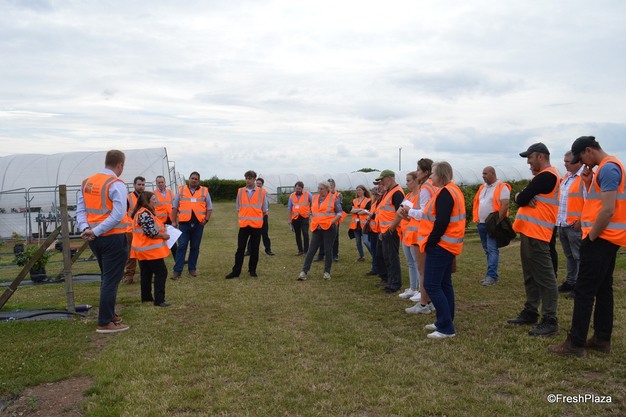
The tour started with a walk out to the trial area and a presentation from Andrea Marshall from Sinclair and Christopher Reid from Westland, who spoke about the challenges in the soft fruit industry: Increasing prices, long lead times, deforestation in countries producing coir, and the looming peat ban. Westland has been working with the James Hutton Institute in trialling peat-free substrates currently used in ornamentals on soft fruit. These can reduce the amount of water and nutrition needed to grow fruit. They have already seen some great results, including a 50% reduction in water and nutrients required when growing.
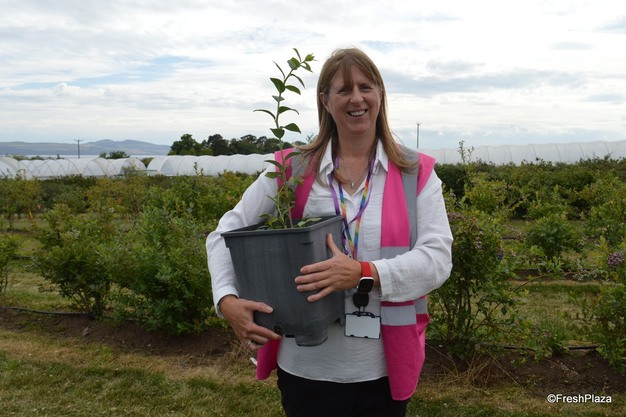
Susan McCallum
Breeding for the future
Susan McCallum, soft fruit researcher and breeder at James Hutton, also spoke about the challenges facing growers, the biggest of which is the increasing cost of production. Costs have been increasing for years, but more so in the last five years, growers have really been feeling the pinch. Energy prices have gone up, transport costs and wage increases, and the price of fertiliser has increased by 47%. Supermarkets and suppliers are always looking to increase profit, she said. The only thing that hasn’t increased has been the returns to growers.
Many growers have not been able to make it work and have simply sold up and left the industry.
“We are looking at the long-term solution, breeding new varieties, and higher quality. Some of the varieties used at the moment were developed 20 years ago. We are addressing this with science. We are looking at using different substrates to produce better roots and grow plants that require fewer nutrients. We only have one year of data, but so far results have been promising. Some plants have fared better with only 50% input. We will repeat the trial for another year.
“We have trials taking place in eight different countries, to see how they perform in different climates. We are trying to develop a genetic basis and build a database. Some varieties might be climate hardy, but the fruit is not good. We are also looking at the varieties which are 20 years old to identify which traits are good and to find the important gnomes.”
James Hutton Institute has been developing a new blueberry variety for the last eight years – the Highland Charm – the fruit has great yield and fruit size with a nice balance of sugar and acid.
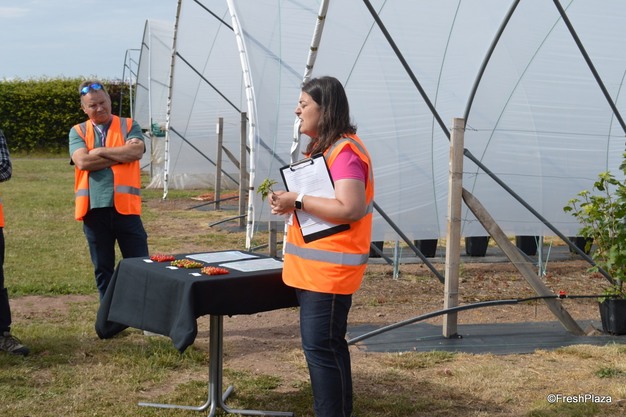
Amanda Moura
Red Currents
Amanda Moura told guests about research and trials being carried out on red currents. This project was started in 2020 with just one Dutch grower; it has now been renewed with four partners in Europe. The majority of red currants on the market are one variety, Rovada. It is very risky to have just one variety in full production, as they can be susceptible to disease, namely, powdery mildew. Rovada has an exceptional shelf life, but the variety was beginning to lose the battle against powdery mildew, and the Dutch growers were requesting an alternative; they were also looking for something sweeter.
The James Hutton Institute is doing trials and selecting plants that are showing resistance to powdery mildew. They have five varieties, which are mildew-free, without any spraying. There is also an interest in both later and earlier varieties to lengthen the season.
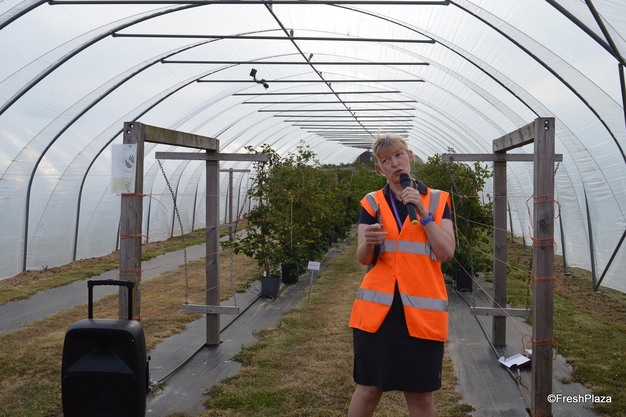
Nikki Jennings
Raspberries and blackberries
Nikki Jennings took the guests to the trial tunnels for blackberries and raspberries, where she spoke about the breeding programs.
Loch Katrine is the first commercial blackberry breeding program, started in 2018. The focus was on flavour as well as easy picking and other attributes. This variety has very low acidity. The Loch Ness variety was developed in the 70’s, a thorn-free vine with constant size. It is now being trialled in Europe with very good feedback.
Eight global partners are undertaking private research with the James Hutton Institute on new raspberry varieties, on primocane and floracane. These are highly productive, with great taste, and they require less input. There are several new selections in progress.
Glen Eden is easy to manage, easy to pick, with big fruit and great flavour. Other varieties are Glen Dee and Glen Mor, an early variety which is also easy to pick.
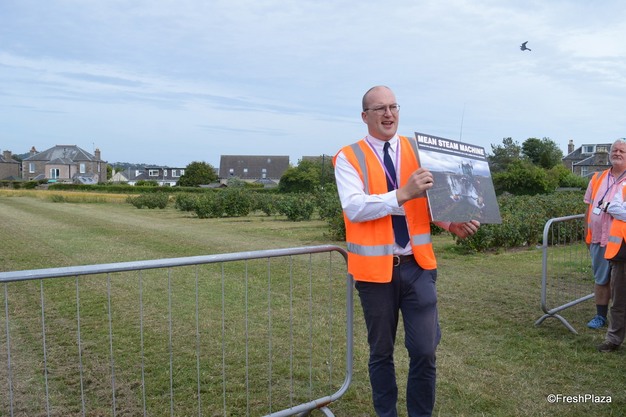
Andrew Christie
The Mean Steam Machine
Andrew Christie took guests through a demonstration of the steam weeder, which recently received a commendation at the Royal Highland Show. This is an alternative to chemical weedkiller. In 2017, some herbicide options were lost to growers, so the James Hutton Institute started a study on alternatives. An electrical weeder was found to use too much power, and the tech behind it was not mature enough. Mechanical weeders caused too much damage to the plants and also stimulated growth in new weeds.
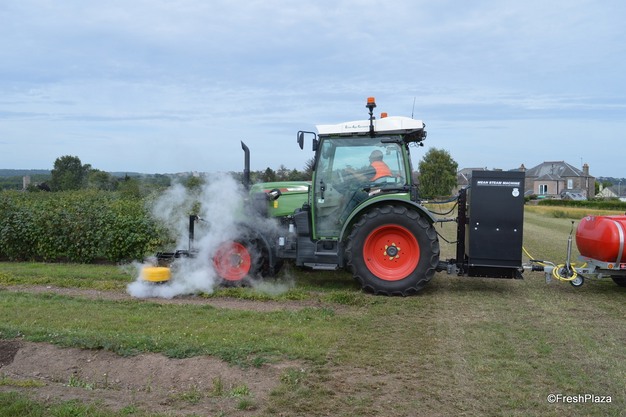
Andrew explained that the steam weeder made more sense, steam generators were already in use, and the heat applied could be controlled. The solution was found with help from a power wash company. The steam weeder is front-loaded and powered by the tractor and destroys the weeds by contact, so the plants are not harmed.
Source: The Plantations International Agroforestry Group of Companies
